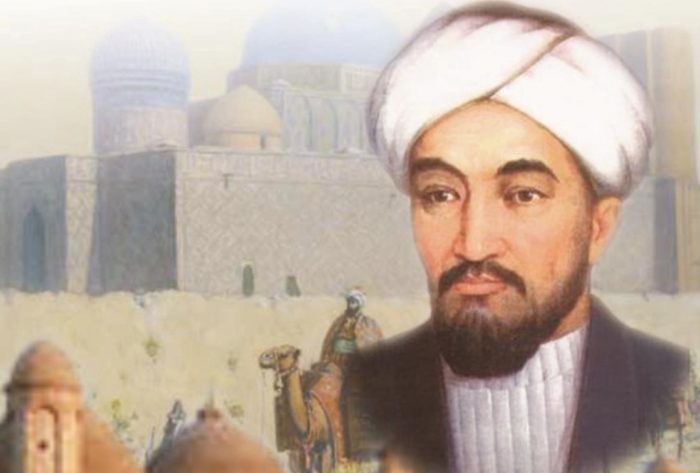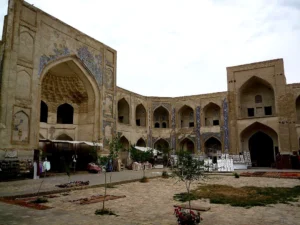Al-Farabi of Kazakhstan

Scholar of East - Abu Nasar Farabi
A prominent thinker of East, Abu Nasir al-Farabi was born in 870 in Farab city (now famous as Otrar), situated at the place of Aris river flowing into Syr Darya river (which corresponds nowadays to Otrarskiy region of the Eastern Kazakhstan). Al-Farabi gained fame as a great intellectual, encyclopedic scientist and philosopher.
At this period of time material and spiritual culture of Central Asia and Kazakhstan peoples has accomplished noticeable richness – especially with its tremendous architectural masterpieces in cities combining arts with architecture principles. Such monuments of those times as the treasure of Amurdarya, the golden decoration assembles from Issik, the Hellenic sculptures and ritons – special horn-like vessels made of ivory featuring – found in Old Nisa, the beautiful images of polychromic writings in Balalik-Tepe and Ajina-Tepe, the library of Otrar (that was considered the second after legendary Alexandria library as far as the number of its writings was concerned), Pejikent, Afrasiab and Shahristan’s luxurious palaces were so splendid and aesthetically complete as to be even today impressive on our feelings. All they are persuasive evidence of geniuses of the region’s peoples. The developments in abstract thinking and philosophizing of this peoples were also proofed by the Zarathustra ideas and number of other religions spreading in the region, as well as the first chronicles being created, folk arts and poetry being flourishing.

The famous Kazakh scientist and investigator of al-Farabi works A.H. Kasimjanov said that “it was the Arab scientists who opened track to the scientific method of experimentation and measurement used in today’s sciences. A. Gumbolt in turn regarded those who represented the science at that time and in that geography, including Al-Farabi, as actual creators of natural sciences”.
It was Al-Farabi who by the virtue of his original ideas left indelible traces in the Medieval epoch writing in such spheres as the classification of sciences, logics, the theory of music, the critics of astrology, theoretical medicine, mathematics and political science. His views were lately borrowed by the following philosophers – such as ibn Sina and ibn Rushd – and afterwards became of great influence on the philosophy of Spinoza, affecting by the former the French philosophers. Therefore, it could be assured that the philosophy of al-Farabi played a huge role in the development of social and philosophical ideas not only in the Near East or Meddle East, but in Europe, too.
“The philosophy of al-Farabi was of decisive influence on the development of advanced social and philosophical thought in Northern Africa and “Arabic” Spain from 11th to 13th centuries, the prominent representatives of which Ibn Baja, Ibn Tufail and Ibn Rushd were”.
The name of al-Farabi has acquired wide popularity in most European countries even between 12th – 13th centuries as scientists started translating his philosophical treatises to old Hebrew and Latin languages. But it was the middle of 19th centuries that the cultural legacy of the thinker was not only published but exposed to scientific scrutiny as well. The mediaeval Europe got acquainted with classic ancient philosophy by the virtue of al-Farabi’s works to a marked degree. It is only during 12th century that his “Classification of sciences” was translated to the Latin language two times. In the period between 12th and 17th centuries that such works of “Alfarabius” as “About the meaning of the Intellect”, “The sources of questions”, “About the ways to happiness”, treatises on logics, comments on “Physics” and “Poetics” of Aristo and other were translated to the Latin for many times. Some treatises of al-Farabi came to us only in Latin translation without its original Arabic texts remaining.
In the framework of the program “The cultural legacy” within a series “The philosophical legacy of the Kazakh people from the ancient times up to the modernity” two volumes of the al-Farabi and another volume of al-Farabi treatises within a series “The world’s philosophical legacy” were published. In 1991 the name of al-Farabi has been given to the leading university of Kazakhstan – the Kazakh National University. In 1993 in the same university the center of the scientific research of al-Farabi’s legacy was opened and up to now continues its works.
At the end I would like to stress the following idea: the works of gifted persons who gained prominence in some field of human activity if scrutinized carefully exemplifies the entire epoch in which they lived. However, Abu Nasr al-Farabi not only represents “the face” of his age but at the same time represents perpetual aspiration of the humanity towards the perfection. The issues arisen by him are still quite relevant for the modern world. The resolution of these issues will aid the further rapprochement of humanity to the ideals of the intercultural dialog between the East and the West.


